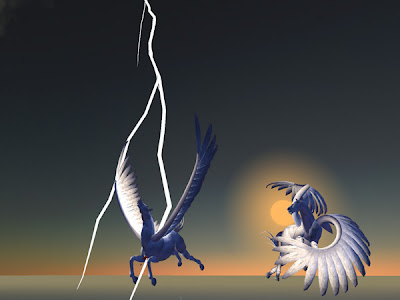Future Art, Beyond Traditional Concepts

Promises, By Starax Statosky - Image courtesy Sl-Art-News
I was inspired by this recent TED talk about "Art that looks back at you". It seems the potential for expression of art is limited only by our imagination.Modern technology allows for new forms of art to be created, but by this I don't just mean different painting techniques using sophisticated software, but entirely new concepts. We can now use computers, robotics, and perhaps even biological manipulations to create new expressions and to represent profound ideas.
Where chemistry created the medium of fireworks, biology can now take us on previously unthinkable artistic journeys. Extreme body modification such as this seen in bmezine, shows identical twins who experiment with transplanting each other's limbs in the wrong places on each other's bodies. And you thought your tattoo made you "transhuman".
Imagine glowing implants, far more beautiful and colourful than any tatoo, animating through your skin. Or perhaps circuitry can be connected directly to your nerve endings, performing actions such as flashes or movements when fired by your brain? Why stop at replacing lost limbs when entirely new body parts can be added, not just for functionality, but for aesthetic appeal?
Body modifications and upgrades are just the beginning. Manipulating our cells and DNA can provide all sorts of potential, from reptile skin to the ability to spin spider silk.
However, despite seemingly unlimited potential for body upgrades, the possibilities fade in comparison to the artistic potential opened up by virtual reality. We've already seen body manipulation here, this is nothing new. What is really exciting about virtual reality is its potential to rewrite the very meaning of existence.
In virtual reality, art can be represented in a more interactive way than in reality. Creations that allow interaction can achieve artistic concepts with both their interactive configuration and their feedback. For example, a large virtual book can read out poetry and vary the tone according to the actions of the user.
Yet neither the interaction nor the feedback needs to be confined by the restraints of reality. The book can be replaced by a metaphor, as can the feedback, and even the interaction. Such concepts that we take for granted, such as time and space, need not even apply in virtual art.
In this technological world, a wonderland of possibilities exist to create a whole new paradigm of art.


Comments